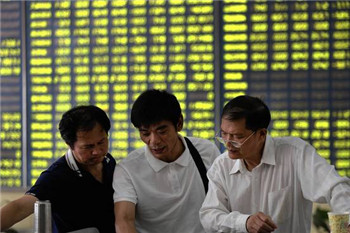(单词翻译:单击)

Chinese authorities took drastic action to try to prop up sinking stocks yesterday, banning listed company shareholders with big stakes from selling shares, and using central bank money to bolster the market.
中国政府昨日采取激进举措试图支撑不断下跌的股市,包括禁止上市公司大股东出售股票,同时利用央行资金支撑市场。
The twin moves came as investors rushed to sell what they still could after a fresh wave of share suspensions that has halted trading in half the market.
在中国出台这两项举措之际,在新一波股票停牌、造成中国股市一半股票暂停交易之后,投资者纷纷抛出手中仍可出售的股票。
Citing the “irrational drop” in share prices in recent days, the securities regulator banned listed company shareholders with stakes of 5 per cent or more from selling any shares for six months. The ban also applies to senior company executives and board members, regardless of the size of their stakes. The regulator said it would “deal sternly” with violators.
中国证监会(CSRC)指出最近几天股市出现“非理性下跌”,规定在6个月内,上市公司持股5%或以上的股东不得出售股票。这一禁令还适用于上市公司高级管理人员以及董事,不管其持股多少。证监会表示将对违反规定者“严肃处理”。
Regulators acted as the Shanghai Composite closed down 5.9 per cent. The Shenzhen index lost 2.5 per cent, while the start-up ChiNext board managed to inch up 0.5 per cent. The renewed selling followed another round of share suspensions overnight that have now halted trading in 1,476 stocks — or more than 50 per cent of all listed companies on China’s two main exchanges. The suspensions have frozen $2.6tn worth of equity, according to Bloomberg calculations.
监管者采取最新行动之际,昨日上证综指收盘下跌5.9%。深证成指下跌2.5%,而创业板指数(ChiNext)微涨0.5%。在投资者再度抛售股票之前,中国股市出现另一轮大规模停牌,目前有1476只股票暂停交易,占沪深股市上市公司总数的50%以上。据彭博(Bloomberg)计算,停牌已导致价值2.6万亿美元的股票被冻结。
The sell-off was equally pronounced in Hong Kong, where global investors typically trade Chinese stocks. The Hang Seng index suffered one of its biggest point drops on record, shedding 5.8 per cent to erase all its gains over the previous 12 months.
香港股市也出现了大幅下挫,全球投资者一般会在香港交易中国内地股票。恒生指数(Hang Seng index)创下有记录以来最大点数下跌之一,跌幅达5.8%,抹去了之前12个月的全部涨幅。
Hong Kong Exchanges & Clearing, the bourse operator, dropped 8.3 per cent, taking its loss over the past five days to almost 30 per cent.
股票交易所运营商——香港交易及结算所有限公司(Hong Kong Exchanges & Clearing)下跌8.3%,使过去5个交易日的累计跌幅接近30%。
As the stock rout continued, Beijing responded with further measures to steady the market. The People’s Bank of China said it was helping state-owned China Securities Finance Corporation access liquidity to help the fund “hold the line against the outbreak of systemic or regional financial risk”. This is the clearest statement yet about what CSF is doing — buying shares directly using PBoC money, a big departure from its traditional role of lending to brokerages to support margin lending.
随着股市继续大幅下挫,中国政府进一步出台措施以稳定市场。中国人民银行(PBoC)表示,正为国有的中国证券金融公司(China Securities Finance Corporation)提供流动性支持,帮助后者“守住不发生系统性、区域性金融风险的底线”。这是迄今关于中国证券金融公司行动的最明确表述:直接使用央行资金购买股票,严重偏离了其向券商放贷以支持保证金贷款的传统角色。
The CSF is also providing Rmb260bn ($41.9bn) of credit to brokerages in order to help them buy shares, according to the China Securities Regulatory Commission. In a statement the CSRC had noted: “There is a mood of panic in the market and a large increase in the irrational dumping of shares, causing a strain of liquidity.”
据中国证监会称,中国证券金融公司还向券商提供了2600亿元人民币(合419亿美元)的信贷以帮助它们购买股票。中国证监会在一份声明中指出:“目前股票市场存在恐慌情绪,非理性抛盘大量增加,导致股市出现流动性紧张的状况。”
As stocks fell, large-caps broke their recent run of gains, with PetroChina— the country’s biggest company — dropping 8.6 per cent.
随着股市下跌,大型蓝筹股停止了最近的上涨步伐,中国最大的公司中石油(PetroChina)下跌8.6%。
Since hitting a seven-year high in mid-June Chinese stocks have been in freefall, with both major indices dropping more than a third.
自今年6月中旬触及7年高点以来,中国股市一直处于自由落体状态,两大主要股指跌幅超过三分之一。


